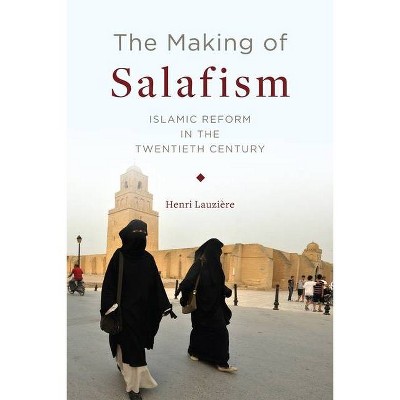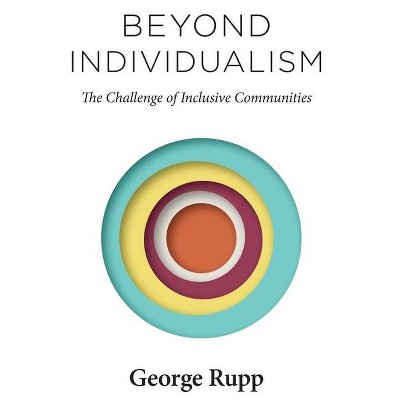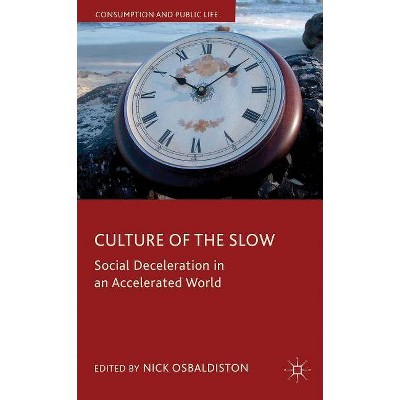The Making of Salafism - (Religion, Culture, and Public Life) by Henri Lauzière (Hardcover)

Similar Products
Products of same category from the store
AllProduct info
<p/><br></br><p><b> About the Book </b></p></br></br>Sees the Salafi movement as a recent conception of Islam projected back onto the past and its purist evolution as a direct result of decolonization<p/><br></br><p><b> Book Synopsis </b></p></br></br>Some Islamic scholars hold that Salafism is an innovative and rationalist effort at Islamic reform that emerged in the late nineteenth century but gradually disappeared in the mid twentieth. Others argue Salafism is an anti-innovative and antirationalist movement of Islamic purism that dates back to the medieval period yet persists today. Though they contradict each other, both narratives are considered authoritative, making it hard for outsiders to grasp the history of the ideology and its core beliefs. <p/>Introducing a third, empirically based genealogy, <i>The Making of Salafism</i> understands the concept as a recent phenomenon projected back onto the past, and it sees its purist evolution as a direct result of decolonization. Henri Lauzière builds his history on the transnational networks of Taqi al-Din al-Hilali (1894-1987), a Moroccan Salafi who, with his associates, participated in the development of Salafism as both a term and a movement. Traveling from Rabat to Mecca, from Calcutta to Berlin, al-Hilali interacted with high-profile Salafi scholars and activists who eventually abandoned Islamic modernism in favor of a more purist approach to Islam. Today, Salafis tend to claim a monopoly on religious truth and freely confront other Muslims on theological and legal issues. Lauzière's pathbreaking history recognizes the social forces behind this purist turn, uncovering the popular origins of what has become a global phenomenon.<p/><br></br><p><b> Review Quotes </b></p></br></br><br>A remarkable study . . . The appeal of <i>The Making of Salafism</i> is in the careful methodological work and in the way Lauziere connects social and political conditions to explain the emergence and the transformation of Salafism.--Journal of Islamic Studies<br><br>The book is a conceptual journey through the concept of Salafism, which removes ambiguities for the readers, particularly saving readers from being trapped in the conceptual chimera which emanates from the presumptions inherent in the prevailing, mis-constructed history of Salafism.--Muhamed Riyaz Chenganakkattil, Indian Institute of Technology "Insight Turkey "<br><br>[Lauzière] takes readers on a journey through the influences of political and social movements, their collaborators, and media pundits on a theological term--<i>salafi</i>.... Highly recommended.--Choice<br><br>A masterpiece of original scholarship and very highly recommended.--Midwest Book Review<br><br>An excellent book that provides a brilliant historical analysis of the emergence and trajectory of the concept of Salafism.... a major contribution to the field.--Middle East Journal<br><br>As a scholar of Islam, Lauzière remains unmatched.--Washington Book Review<br><br>Henri Lauziere is committed to deepening our understanding of Islamic reform, especially those groups and individual scholars who use the moniker salafi or are identified by others with this term. And he does so elegantly.--Journal of the American Academy of Religion<br><br>Most valuable to this work that seems absent or overlooked in other texts is the importance of the linguistic aspects of Salafism, particularly the different linguistic interpretations of Salafism to different people and at different times.--ID: International Dialogue<br><br>Timely and important contribution.... excellently crafted. [The Making of Salafism] serves as an invaluable tool for a continuous interrogation of the concept of Salafism.--Islamic Africa 7<br><br>While Lauzière's impressive exposition of the term's slippery semantic history is primarily of interest to specialists, his analysis is of crucial importance in demonstrating Salafism's commitment to textual literalism.--New York Review of Books<br><br>An essential resource for those trying to understand Salafis and Salafism, confusing terms with very contested histories. Henri Lauzière brings sense and order to a debate that reaches back to medieval times yet still flashes across screens today. <i>The Making of Salafism</i> illuminates a crucial aspect of the intellectual history of the Middle East and North Africa in the twentieth century.--Jonathan Brown, Georgetown University<br><br>This book brings much needed clarity to the history of Salafism and revises common accounts of a little known yet much talked about Islamic intellectual trend. Henri Lauzière has skillfully fleshed out the genealogy of Salafism, and his work will have an important impact on the field of the history of ideas in the modern Muslim world.--Malika Zeghal, Harvard University<br><br>This book fills a crucial gap in modern Islamic intellectual history: it untangles the now ubiquitous term Salafism, showing how the concept was invented, used, and contested through the twentieth century as both an analytical tool and a self-identifier. This conceptual history is paired with rich biographical material, which locates the shifting meanings of Salafism in the context of the wider historical processes of colonialism and independence.--Ahmed El Shamsy, University of Chicago<br><br>This engaging and brilliantly researched book offers the reader the first comprehensive study of the process by which the conceptualization of Salafism developed. . . . It is an excellent book that should receive serious consideration from all historians interested in modern Islam.--Etty Terem "American Historical Review "<br><p/><br></br><p><b> About the Author </b></p></br></br>Henri Lauzière is assistant professor of history at Northwestern University.
Price History
Cheapest price in the interval: 55 on November 8, 2021
Most expensive price in the interval: 55 on December 20, 2021
Price Archive shows prices from various stores, lets you see history and find the cheapest. There is no actual sale on the website. For all support, inquiry and suggestion messages communication@pricearchive.us




















